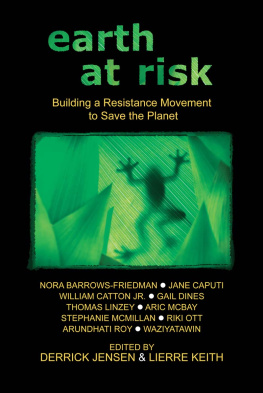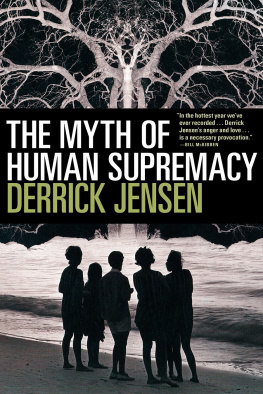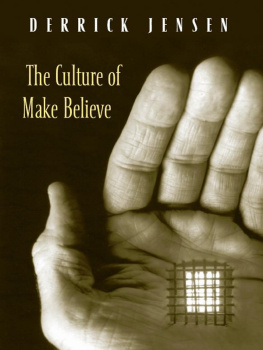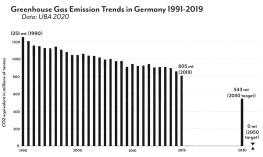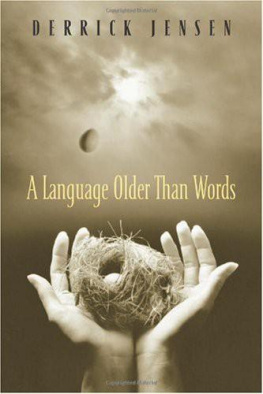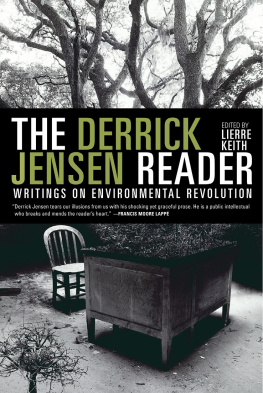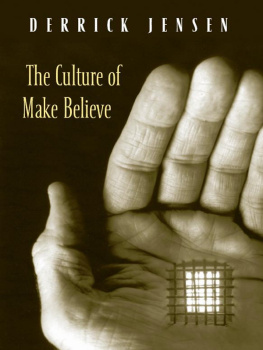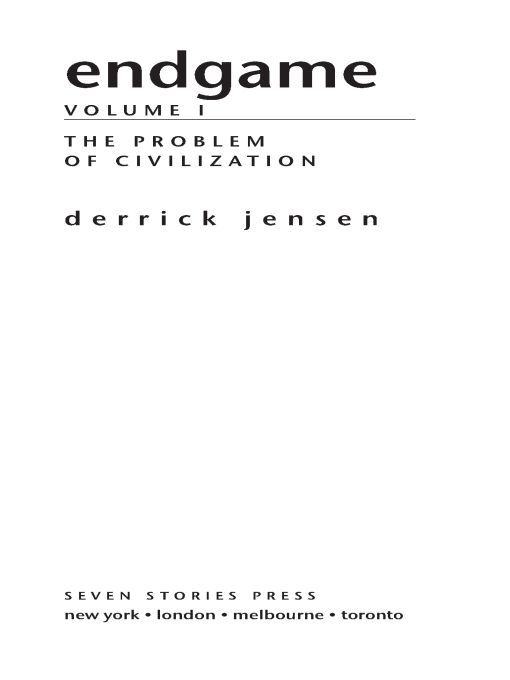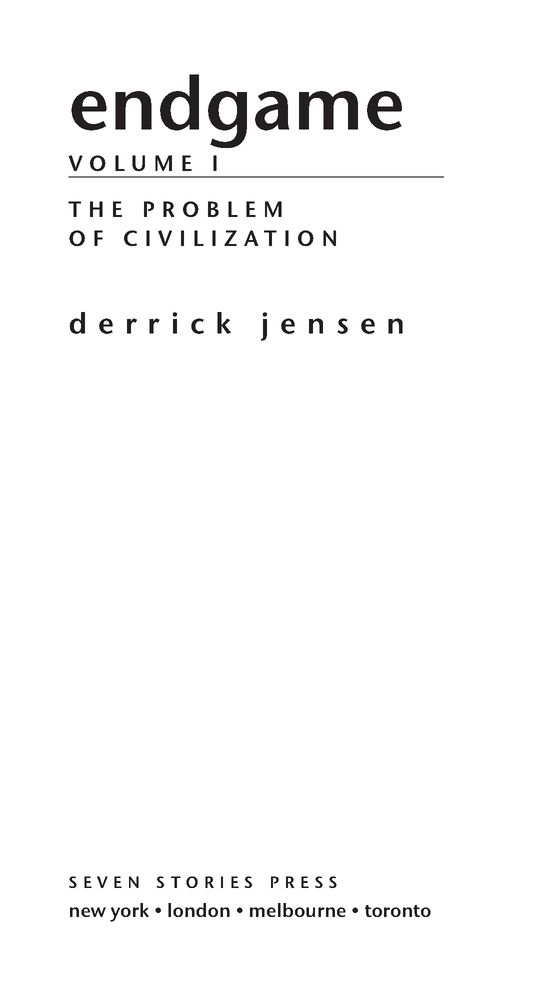Table of Contents
Also by Derrick Jensen
Railroads and Clearcuts
Listening to the Land
A Language Older Than Words
Standup Tragedy (live CD)
The Culture of Make Believe
The Other Side of Darkness (live CD)
Strangely Like War
Walking on Water
Welcome to the Machine
Premises
PREMISE ONE: Civilization is not and can never be sustainable. This is especially true for industrial civilization.
PREMISE TWO: Traditional communities do not often voluntarily give up or sell the resources on which their communities are based until their communities have been destroyed. They also do not willingly allow their landbases to be damaged so that other resourcesgold, oil, and so oncan be extracted. It follows that those who want the resources will do what they can to destroy traditional communities.
PREMISE THREE: Our way of livingindustrial civilizationis based on, requires, and would collapse very quickly without persistent and widespread violence.
PREMISEFOUR: Civilization is based on a clearly defined and widely accepted yet often unarticulated hierarchy. Violence done by those higher on the hierarchy to those lower is nearly always invisible, that is, unnoticed. When it is noticed, it is fully rationalized. Violence done by those lower on the hierarchy to those higher is unthinkable, and when it does occur is regarded with shock, horror, and the fetishization of the victims.
PREMISE FIVE: The property of those higher on the hierarchy is more valuable than the lives of those below. It is acceptable for those above to increase the amount of property they controlin everyday language, to make moneyby destroying or taking the lives of those below. This is called production. If those below damage the property of those above, those above may kill or otherwise destroy the lives of those below. This is called justice.
PREMISE SIX: Civilization is not redeemable. This culture will not undergo any sort of voluntary transformation to a sane and sustainable way of living. If we do not put a halt to it, civilization will continue to immiserate the vast majority of humans and to degrade the planet until it (civilization, and probably the planet) collapses. The effects of this degradation will continue to harm humans and nonhumans for a very long time.
PREMISE SEVEN: The longer we wait for civilization to crashor the longer we wait before we ourselves bring it downthe messier the crash will be, and the worse things will be for those humans and nonhumans who live during it, and for those who come after.
PREMISE EIGHT: The needs of the natural world are more important than the needs of the economic system.
Another way to put Premise Eight: Any economic or social system that does not benefit the natural communities on which it is based is unsustainable, immoral, and stupid. Sustainability, morality, and intelligence (as well as justice) require the dismantling of any such economic or social system, or at the very least disallowing it from damaging your landbase.
PREMISE NINE: Although there will clearly someday be far fewer humans than there are at present, there are many ways this reduction in population may occur (or be achieved, depending on the passivity or activity with which we choose to approach this transformation). Some will be characterized by extreme violence and privation: nuclear Armageddon, for example, would reduce both population and consumption, yet do so horrifically; the same would be true for a continuation of overshoot, followed by a crash. Other ways could be characterized by less violence. Given the current levels of violence by this culture against both humans and the natural world, however, its not possible to speak of reductions in population and consumption that do not involve violence and privation, not because the reductions themselves would necessarily involve violence, but because violence and privation have become the default of our culture. Yet some ways of reducing population and consumption, while still violent, would consist of decreasing the current levels of violencerequired and caused by the (often forced) movement of resources from the poor to the richand would of course be marked by a reduction in current violence against the natural world. Personally and collectively we may be able to both reduce the amount and soften the character of violence that occurs during this ongoing and perhaps long-term shift. Or we may not. But this much is certain: if we do not approach it activelyif we do not talk about our predicament and what we are going to do about itthe violence will almost undoubtedly be far more severe, the privation more extreme.
PREMISE TEN: The culture as a whole and most of its members are insane. The culture is driven by a death urge, an urge to destroy life.
PREMISE ELEVEN: From the beginning, this culturecivilizationhas been a culture of occupation.
PREMISE TWELVE: There are no rich people in the world, and there are no poor people. There are just people. The rich may have lots of pieces of green paper that many pretend are worth somethingor their presumed riches may be even more abstract: numbers on hard drives at banksand the poor may not. These rich claim they own land, and the poor are often denied the right to make that same claim. A primary purpose of the police is to enforce the delusions of those with lots of pieces of green paper. Those without the green papers generally buy into these delusions almost as quickly and completely as those with. These delusions carry with them extreme consequences in the real world.
PREMISE THIRTEEN: Those in power rule by force, and the sooner we break ourselves of illusions to the contrary, the sooner we can at least begin to make reasonable decisions about whether, when, and how we are going to resist.
PREMISE FOURTEEN: From birth onand probably from conception, but Im not sure how Id make the casewe are individually and collectively enculturated to hate life, hate the natural world, hate the wild, hate wild animals, hate women, hate children, hate our bodies, hate and fear our emotions, hate ourselves. If we did not hate the world, we could not allow it to be destroyed before our eyes. If we did not hate ourselves, we could not allow our homesand our bodiesto be poisoned.
PREMISE FIFTEEN: Love does not imply pacifism.
PREMISE SIXTEEN: The material world is primary. This does not mean that the spirit does not exist, nor that the material world is all there is. It means that spirit mixes with flesh. It means also that real world actions have real world consequences. It means we cannot rely on Jesus, Santa Claus, the Great Mother, or even the Easter Bunny to get us out of this mess. It means this mess really is a mess, and not just the movement of Gods eyebrows. It means we have to face this mess ourselves. It means that for the time we are here on Earthwhether or not we end up somewhere else after we die, and whether we are condemned or privileged to live herethe Earth is the point. It is primary. It is our home. It is everything. It is silly to think or act or be as though this world is not real and primary. It is silly and pathetic to not live our lives as though our lives are real.


